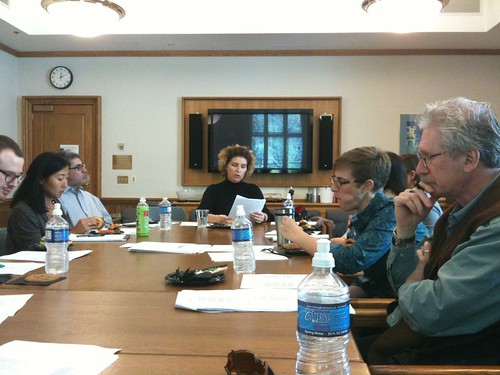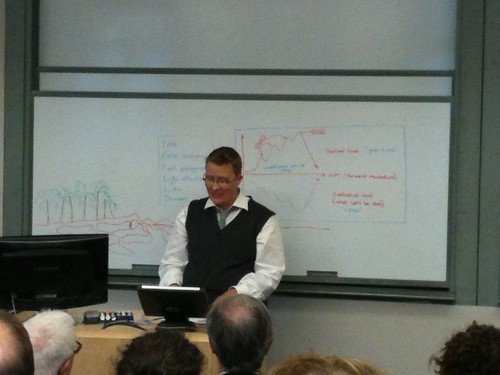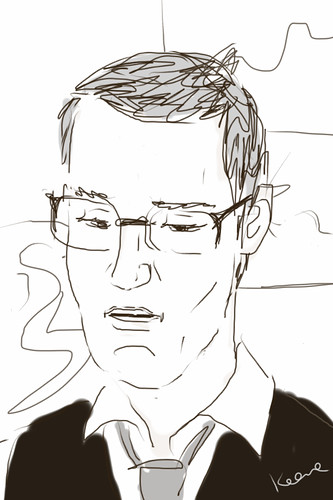 |
| Claudia Roquette-Pinto, at the P&PCW workshop |
Back in July I posted an entry on the contemporary
Brazilian poet
Claudia Roquette-Pinto (1963-), a Rio native, author of five books and one of the most acclaimed writers of her generation in Brazil. I also
translated one of her poems, "Space-Writing," which I'd found in a different translation by
Charles Perrone in the collection
Outras Praias*/13 Poetas Brasileiras Emergentes - Other Shores/13 Emerging Brazilian Poets, and wrote a few thoughts about that poem. Originally she was slated to visit the university last spring, but the visit had to be postponed till this fall, but that turned out to be fortuitous as it gave me an opportunity, working with her via email, to translate a few more of her poems. I can say without hesitation that she was a pleasure to work with, gracious and gentle in her corrections and suggestions, and highly informative in how she helped me to dive--as I still am--beneath the surface and upper layers of her poems. As part of her visit, which the university's
Department of Spanish and Portuguese and the cross-departmental
Poetric and Poetics Colloquium and Workshop organized, she read for and spoke to a class taught by one of my colleagues,
César Braga-Pinto; gave a public reading last night, during which she guided the audience through her career, with accompanying poems; and participated in a conversation and workshop this afternoon. At her reading, I joined her and read the English translations, most by
Guy Bennett and
Michael Palmer, but with a few of my own, of her poems, and it was almost otherworldly to hear the poems aloud in Portuguese, read by their author, since I'd been living for several months with them almost on mute, or in their (my) imperfect English versions. (This was the second time I've ever done this; the other time was in
Italy, when I read
Elizabeth Bishop's poems in their original English to accompany the beautiful translations by poet
Ottavio Fattica; but I had never done this before a room full of university colleagues, so I was unspeakably terrified, but I think it went well.)
The workshop today helped me solve one piece of the puzzle of "Space-Writing": what I'd translated as "sealer" in the penultimate line could also be "shutter," which is probably more apt and, interestingly, has more assonance with "rapture," which could also, I realized, be rendered as "capture," though the former word in English carries, though they're usually lost on most of us, the sense of being captured, kidnapped, taken; in fact, "rapture"'s metaphorical sense is now its dominant one. But the other deeper meanings nevertheless remain. Claudia resolved another riddle when, in describing her intent, she clarified for me that the English wordI'd chosen in another translation was perhaps
too mild; in American English (as opposed to British English, say), "quarrel" connotes an argument that doesn't reach the level of a battle, or all out war, though that might be the result of an ongoing quarrel. So a strong word, like "struggle," or even "battle," with a similar metrical length (a trochee) and end-word consonance (that final "uhl") is probably a better option. I have now made changes in both cases.
Roquette-Pinto in both her public reading and the workshop talked about her poetics, how she fit or didn't within various Brazilian literary schools and approaches, and her formal evolution. One thing a reader of her books notices is how the poems formally change--from the more formally conservative poetry in her first book, to poems with considerable linguistic and aural leaps and gaps, poems informed by the tradition of Concretion, poems in which she overtly foregrounds the polysemous possibilities of words, to poems that become more discursive and, as is the case with several of the poems of hers I translated, more prosy in their rhythms and concerns. She also spoke about how her personal challenges--including the horror of her sister being kidnapped--surfaced in oblique ways in her poems. In one of my favorites of her poems, "Alma corsária" ("Pirate Soul"), she engages in an intertextual dialogue with a number of writers who have inspired and informed her work, including
Manuel Bandeira,
Carlos Drummond de Andrade, Isaac Babel, Walt Whitman, and
Clarice Lispector, even directly quoting the last, while also referencing her sister's plight. Another challenge she discussed was having completed a novel she was compelled to write; she had felt herself at a distance from poetry, but saw that her later poems were, in their own way, a journey to and preparation for the prose work she needed to write. (I hope she does publish the novel some day soon.)
She now heads to several other campuses (
Smith College, I believe, and
Yale University), as well as other parts of the country (out west, New York), before heading back to Brazil, but I am incredibly delighted that she was able to spend several days on campus, and look forward to continuing a dialogue, in and through poetry, with her. Now, if only I can afford to get to Brazil!
***
 |
| Goldie Goldbloom delivering her talk |
Every year the university's undergraduate Creative Writing program hosts a fiction writer who holds the rank of visiting assistant professor and teaches two classes, one an advanced fiction workshop, the other a literature course, as a result of a gift by a distinguished alumnus, businessman, bibliophile and book artist,
Simon Blattner. Prior Simon Blattner Visiting Assistant Professors have included
Tara Ison, Sasha Hemon, Patrick Somerville, Suki Kim, and
Cristina Henriquez; this year's visitor is
Goldie Goldbloom. I was unaware of Goldbloom's work until I learned last spring that she would spending a quarter at the university, and I've enjoyed familiarizing myself with it. A native of Western Australia, Goldbloom, a Hassidic Jew, has taught both elementary and high school, and served as a librarian. She now lives in Chicago with her 8 children, and has published two books, a collection of stories entitled
You Lose These (Fremantle Press) and a novel, entitled
The Paperbark Shoe (Picador, 2008), which won the
AWP Novel Award in 2008 and the
Great Lakes College Association’s New Writer’s Award in 2011. Her work explores a range of topics, but certain ones, including childhood, difference, queerness, community and its absence, and self-creation come repeatedly come to the fore.
 |
| Goldbloom |
Goldbloom's Blattner lecture, "Literary Spelunking: A map to explore what lies beneath the surface," examined the place and function of subtext in a story, "We Didn't," by our colleague
Stuart Dybek. Goldbloom, however, didn't just map out how the story worked or how to discern the subtext(s) in it, but also drew an actual
map--along with a literary diagram--of the subterranean caves beneath the desert of her native western Australia. (I love when writers display any sort of talent for visual art and drafting.) As she was delivering her talk, I decided to draw her, and my quick iPhone sketch is at left. Concluding her talk, she then read from her novel, and her performance of its account of a child burn victim was as evocative as the her, often poetic prose. I'm looking forward to reading more of Goldbloom's work in the future, and trust her students feel as lucky as we do having her on campus for the quarter.













No comments:
Post a Comment